Edie Melson's Blog, page 26
January 26, 2025
Paint Your Story
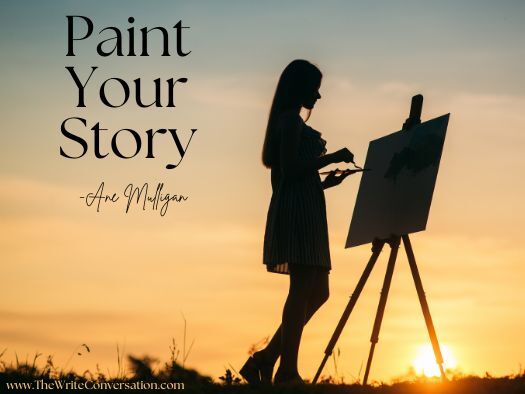
by Ane Mulligan @AneMulligan
Colors affect us in many ways. That’s terrific if you’re writing a picture book or a coffee table book about art, food, or travel. But how can you use it on the written page to evoke an emotional response?
Sounds and smells summon memories and emotional responses, depending on the original event. Colors can do the same. We describe spaces our characters enter, so incorporate color to convey the mood or ground another character's emotional response.
Here's what my research gleaned:
Red - stimulates the mind and nervous system. Will stimulate appetite. Bright red can be an irritant. Symbolizes the vital force, energy, passion, courage, and action. It is associated with leadership, power, the will, and the body. Spontaneity, impulsiveness, and the instinctual sexual forces are its qualities. It stimulates activity, intensity, and extroversion. Red brings out the revolutionary and leads us into affirmative thought and action. I like to wear red when I need to strengthen my resolve or pursue something I want.
Yellow - stimulates the nervous system as well as the mind. Symbolizes the mental force, clarity, perception, understanding and wisdom. Confidence, curiosity, and practical application of wisdom are its qualities. Humor and mental detachment make yellow significant for bringing new life to ways of thinking and seeing. Wearing yellow and gold tones brings a rich meaning to my activities. It always seems to bring crystallization to events and issues.
Orange - stimulates the mind and provides and emotional lift. Will stimulate the appetite. Requires the eye to focus. Conveys warmth and assurance. Symbolizes the social force, emotions, attractiveness, joy and independence. Self-assuredness, amiability and constructiveness are it’s qualities. Orange is about spreading joy and happiness and giving emotional pleasure. It helps become free of inhibitions and lightens the mood.
Green - lowers the blood pressure, relaxes the nervous system, calms the mind. Does not require the eye to focus. Symbolizes the balancing forces, peace, compassion, and renewal. Moderation, harmony, nurturing and diplomacy are it’s qualities. It calms the energies and prevails over excess. Like nature it can draw away energy from being too physical or mental and introduce a stillness that produces a contemplative atmosphere. Relaxation issues from it. For me wearing green increases the sense of wonder and brings to you that “let it be” feeling.
Indigo - Symbolizes the intuitive force, dreams, the unconscious and the invisible. Associated with it the powers of mental telepathy, empathy, and imagination. Deja vu, knowing what will happen before it happens and that sense of being connected to a unifying nature are the qualities of indigo. It is a color of those who intuit a deeper truth. For me it has a mysterious quality of the deep sea. It draws you in like the reflection of the moon on the water.
Blue - diminishes the appetite. Blue has a calming effect. Does not require the eye to focus. Symbolizes the communicative force, speech, messages, and ideas. It relaxes and opens the mind to share thoughts and ideas. Idealism, sincerity, mental empathy, and relaxation are associated with blue. It brings out affection, loyalty, and inspiration. to me it is the color of friendship and develops that unconditional bonding. I like to wear it to enhance my blue eyes and the color inspires trust and steadiness.
White - creates a stark atmosphere. White symbolizes purity, union, truth, and innocence. Its qualities are cleanliness, self-sacrifice and beginnings. Purity essentially opens us to the deeper levels of existence and renews the souls experience of the moment. Holiness and divinity in its feminine aspects are associated with white. To me wearing white is being present for something greater than myself. It omits the presence of self from the event and takes on what there is to learn from it.
Violet - Very subduing color. It symbolizes the creative force, beauty, inspiration, and artistry. Energetically violet inspires the receptive soul to express itself in art, music, spiritual ideals and selfless acts of love. It is the universal call to excellence that inspires great things and works of art. Violet brings a soft, ethereal quality to the one wearing it and it’s subtlety and fineness have a strong presence invoking the higher virtues in life.
Aqua - Symbolizes freshness, the pristine and unspoiled, vigor and movement. Vivacious and dramatic in a refreshing way. Confidence, strength, and strong individualism bordering on eccentricity are associated with aqua. When I see someone wearing aqua I know they are really excited about life and bring the humor of life to the situation. Fearless and creative the color encourages a festive and celebratory mood. It’s close association with water conjures the more emotional qualities of fun, letting go and joy.
Gold - Symbolizes love of spirit, the primordial yearning towards the essence. Meaning, purpose, awe, and spiritual love are its qualities. All quests of the heart are associated with the color gold. Wealth of spirit conjure gold. Gold has an ancient connection to the heart’s desire for power and spiritual mysteries. Gold conjures the beautiful sculptures of the civilizations known for mystic powers, high mathematics, and profound sciences. Gold is the color of attainment and profound concentration.
Brown - Evokes a sense of tranquility. It symbolizes the earth, nurturing, contented sensuality, and productivity. Passive, sensual, fertile, and generous qualities are associated with brown. Wearing brown has an assured feeling of being very grounded in and belonging to feeling. Sensuality at its deepest roots is conjured by the infinite hues and tones of brown.
So there you go. Next time your heroine paints her room, you can incorporate color into your writing to evoke a response from the hero.
TWEETABLEPaint your story with vibrant colors. from @AneMulligan on @EdieMelson (Click to Tweet)
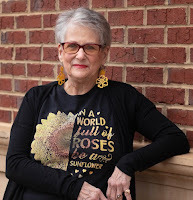 Ane Mulligan has been a voracious reader ever since her mom instilled within her a love of reading at age three, escaping into worlds otherwise unknown. But when Ane saw Mary Martin in PETER PAN, she was struck with a fever from which she never recovered—stage fever. She submerged herself in drama through high school and college. Years later, her two loves collided, and a bestselling, award-winning novelist emerged. She resides in Sugar Hill, GA, with her artist husband and a rascally Rottweiler. Find Ane on her website, Amazon Author page, Facebook, Twitter, and The Write Conversation.
Ane Mulligan has been a voracious reader ever since her mom instilled within her a love of reading at age three, escaping into worlds otherwise unknown. But when Ane saw Mary Martin in PETER PAN, she was struck with a fever from which she never recovered—stage fever. She submerged herself in drama through high school and college. Years later, her two loves collided, and a bestselling, award-winning novelist emerged. She resides in Sugar Hill, GA, with her artist husband and a rascally Rottweiler. Find Ane on her website, Amazon Author page, Facebook, Twitter, and The Write Conversation.
Published on January 26, 2025 22:00
January 25, 2025
Find True Writing Success When You Focus on These 5 Things

by Edie Melson @EdieMelson
For where your treasure is, there your heart will be also. Matthew 6:21
One thing I’ve noticed is that we writers are way too hard on ourselves. We’re constantly comparing ourselves to each other, looking for affirmation through someone else’s opinion about our work and even our calling.
We check to see how many views our articles get, how many followers our blogs have and how many stars the reviewer gave our latest book. These things can undermine and sometimes even totally destroy our perspective, not to mention our confidence. Because, let’s face it, there is always someone willing to point out what we did wrong or could have done better.
If we’re not careful, we can get to the point where we treasure what others are saying about us more than what God is doing through us.
So how do we stay focused in this crazy writing world where everyone seems eager to pass judgment? I think the key to thriving is to keep focused on what and especially on WHO truly matters.
These are somethings I focus on when life seems out of focus. Because when life goes out of focus, it’s almost always a priority issue.
These are the things I look at to make sure my priorities are in line.
1. My prayer focus. Even though I know I need to always begin writing with a time of prayer, that seems to be the first thing I forget when I get stressed. Having a daily quiet/prayer time is part of my life routine, but that’s not enough. I must begin every writing time with prayer.
2. Time in God’s word. If my daily time with God begins to shrink or disappear, then my writing life suffers.
3. Remembering the why. Yes, I’ve always been a writer, but when I answered God’s call to write for Him, my foundation changed. When I find myself chasing numbers, I go back to number 1. I refocus on my calling and more importantly the one who called me.
4. I refocus on relationships, instead of connections. There is a difference in these two. Relationships are built, connections are just numbers. Connections—when nurtured—often grow into relationships, but only when we concentrate on serving people instead of amassing numbers.
5. I rehearse what God has already done. No matter where you are on your writing journey, you have already seen God at work. Make note of the good things along the way—the whispers from God you’ve heard in your soul, the honest words of encouragement others have spoken or written to you, the successes you’ve had. We place far too much focus on the things we’ve done wrong, instead of the amazing things God is doing through us.
Bottom LineI’ve found that when I treasure God’s word and His opinion, my heart stays safe and protected. I’m insulated from a worldly perspective determined to destroy anything God has called good.
TWEETABLEFind True Writing Success When You Focus on These 5 Things from @EdieMelson (Click to Tweet)
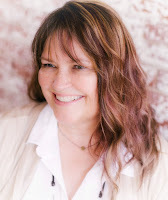 Edie Melson is a woman of faith with ink-stained fingers observing life through her camera lens. She’s a writer who feels lost without that device & an unexpected speaker who loves to encourage an audience. She also embraces the ultimate contradiction of being an organized creative. She knows the necessity of Soul Care and leads retreats, conferences & workshops around the world on staying connected to God. Her numerous books, including the award-winning Soul Care series & reflect her passion to help others develop the strength of their God-given gifts. Her blog, The Write Conversation is recognized as one of the top 101 industry resources.
Edie Melson is a woman of faith with ink-stained fingers observing life through her camera lens. She’s a writer who feels lost without that device & an unexpected speaker who loves to encourage an audience. She also embraces the ultimate contradiction of being an organized creative. She knows the necessity of Soul Care and leads retreats, conferences & workshops around the world on staying connected to God. Her numerous books, including the award-winning Soul Care series & reflect her passion to help others develop the strength of their God-given gifts. Her blog, The Write Conversation is recognized as one of the top 101 industry resources. She and husband Kirk have been married 43+ years and raised three sons. They live in the foothills of the Blue Ridge Mountains and can often be found hiking—with Edie clinging to the edge of a precipice for the perfect camera angle and Kirk patiently carrying her camera bag and tripod. Connect with her on her website, www.EdieMelson.com and through social media.
Published on January 25, 2025 22:00
January 24, 2025
Genre-Specific Writing Tips for Sci-fi and Fantasy Writers

by Zena Dell Lowe @ZenaDellLowe
Whether you're crafting a sci-fi epic, a heartwarming romance, or a spine-tingling thriller, each genre has rules that must be adhered to if the writer hopes to shine. Understanding the nuances of your genre is crucial because it allows you to meet and exceed your readers' expectations. Today, let’s dive into genre-specific tips for writing sci-fi and fantasy.
The Importance of World-Building for Writers
World-building is the cornerstone of sci-fi and fantasy writing. While all genres require some level of world-building, sci-fi and fantasy demand immersive, intricate worlds that feel tangible and unique. It's not just about setting; it’s about crafting societies, ecosystems, histories, and systems of power or magic that shape your characters and drive your plot.
To create a compelling world, the first thing you need to do is define its rules. Why? Because the rules you establish will shape everything else—from the conflicts your characters face to the boundaries of what’s possible in your story. By grounding your world in consistent principles, you create a foundation of believability that allows readers to suspend disbelief and dive fully into your narrative.
Five Types of Rules in World-Building
Your world’s rules dictate how everything operates, from physical phenomena to societal norms. Here are five key categories to consider:Physical Laws. Define how the physical world operates. Does gravity work differently? What role does technology play? For instance, Isaac Asimov's Foundation series hinges on the meticulously crafted "Three Laws of Robotics," which govern human-robot interactions.Magic Systems. If magic exists, it needs rules. Establish how it works, its limitations, and what it costs. Brandon Sanderson’s Mistbornseries features a magic system based on ingesting metals, with each metal providing a specific ability. These rules are crucial to the story's conflicts and strategies.Social Structures. Create hierarchies, power dynamics, and cultural norms. Suzanne Collins’ The Hunger Games uses the division between the Capitol and the districts to create societal tension that drives the series.Economic Systems. How do trade, resources, and currency function? Frank Herbert’s Dune is a prime example, with the scarcity of spice fueling interstellar politics and economics.Religious Beliefs. Includes gods, rituals, and moral codes. Neil Gaiman’s American Gods uses the tension between old gods and new as a thematic and narrative driver.
Building Culture: Four Examples
World-building isn’t just about rules; it’s about making your world feel alive. Culture adds depth, showing how people interact with and adapt to their environment. Here are five standout examples:Wakanda in Black Panther. A seamless blend of advanced technology and traditional African culture. Wakanda feels real because it incorporates cultural traditions alongside futuristic tech.The Wizarding World in Harry Potter. From Hogwarts to Quidditch, J.K. Rowling creates an entire magical society, complete with customs and quirks, that feels as vibrant as the real world.The Fremen in Dune. Their survival techniques and water conservation methods reflect a culture shaped by the harsh desert environment of Arrakis, grounding Herbert’s world in realism.The Capital in The Hunger Games. Its opulent fashion, shallow entertainment, and oppressive political power contrast sharply with the districts, highlighting themes of inequality and rebellion.
Three Tips for Creating History
The past shapes the present, even in fictional worlds. Crafting a rich history adds layers of depth to your narrative.Timeline Creation. Map out key events that shaped your world. These events can inform your plot and add historical weight to your story. For instance, J.R.R. Tolkien’s The Silmarillion establishes the ancient history behind The Lord of the Rings.Legend and Lore. Myths, legends, and historical figures bring texture and meaning. In The Lord of the Rings, Isildur’s story provides critical context for Frodo’s quest to destroy the One Ring.Cultural Impact. Show how historical events influence societal norms and character motivations. Robert Jordan’s The Wheel of Timeuses past prophecies and wars to shape the current conflicts.
Summary and Actionable Steps
World-building is an art that can elevate your sci-fi or fantasy story to new heights. To master it:Start with the Rules: Define how your world operates and stick to the rules.Build Culture: Add depth by exploring customs, traditions, and societal norms.Create History: Develop a backstory that enriches the current narrative.
As you craft your worlds, remember that they should serve the story, not overshadow it. Ground your fantastical elements with relatable characters and compelling stakes. When done right, your world will transport readers, immersing them in a realm they’ll never want to leave.
Happy writing!
TWEETABLEGenre-Specific Writing Tips for Sci-fi and Fantasy Writers - @ZenaDellLowe on @EdieMelson (Click to Tweet)
 Zena has worked professionally in the entertainment industry for over 20 years as a writer, producer, director, actress, and story consultant. Zena also teaches advanced classes on writing all over the country. As a writer, Zena has won numerous awards for her work. She also has several feature film projects in development through her independent production company, Mission Ranch Films. In addition to her work as a filmmaker, Zena launched The Storyteller’s Mission with Zena Dell Lowe, a podcast designed to serve the whole artist, not just focus on craft. In 2021, Zena launched The Storyteller’s Mission Online Platform, where she offers advanced classes and other key services to writers. Zena loves story and loves to support storytellers. Her passion is to equip artists of all levels to achieve excellence at their craft, so that they will truly have everything they need to change the world for the better through story.
Zena has worked professionally in the entertainment industry for over 20 years as a writer, producer, director, actress, and story consultant. Zena also teaches advanced classes on writing all over the country. As a writer, Zena has won numerous awards for her work. She also has several feature film projects in development through her independent production company, Mission Ranch Films. In addition to her work as a filmmaker, Zena launched The Storyteller’s Mission with Zena Dell Lowe, a podcast designed to serve the whole artist, not just focus on craft. In 2021, Zena launched The Storyteller’s Mission Online Platform, where she offers advanced classes and other key services to writers. Zena loves story and loves to support storytellers. Her passion is to equip artists of all levels to achieve excellence at their craft, so that they will truly have everything they need to change the world for the better through story.To find out more about Zena or her current courses and projects, check out her websites at WWW.MISSIONRANCHFILMS.COM and WWW.THESTORYTELLERSMISSION.COM
Published on January 24, 2025 22:00
January 23, 2025
How Editing in Layers Can Make Good Writing Great
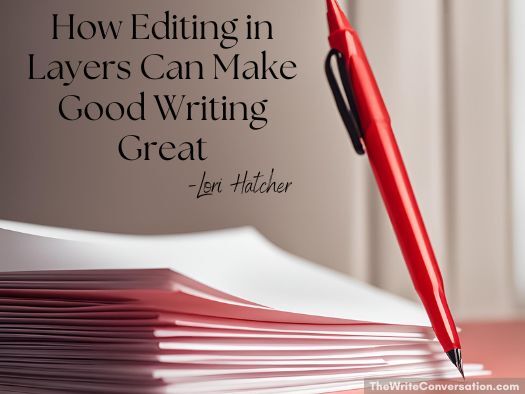
by Lori Hatcher
In the 1970’s, inspired by a magazine spread she’d seen, my mother committed an atrocity. She painted my grandmother’s antique maple bedroom furniture white with gold trim.
Let’s pause for a moment while I compose myself. The memory still hurts my heart.
Years later, I inherited the furniture and set about to restore it to its former beauty.
In my ignorance, I assumed I could pour some paint remover on it and watch the ugly paint bubble up and slide off.
Are you laughing yet?
Instead, I wound up using chemicals, a sander, a heat gun, tiny tools, and lots and lots of muscle to remove the layers of paint that obscured the wood. Every layer I scraped, melted, sanded or picked off brought me closer to the beauty of the original piece, but it didn’t happen quickly. Or easily.
Editing is a lot like furniture refinishing.
If we attempt to edit a piece, especially a lengthy piece like a long article or a book manuscript in one fell swoop, we’re going to miss things. Things we’ll wish we’d smoothed out, rearranged, tweaked, or removed.
When I edit my clients’ or my own work, I edit in layers. I make several passes through a document looking for different things. I hope my checklist will help you consider the many layers of your work as you self-edit.
7 Editing Layers to Take Writing from Good to Great
Layer #1 (a big one): Content Does your manuscript contain everything it needs to thoroughly address the topic, story line, or premise?
Layer #2 (another big one): Flow and StructureHave you presented the story or content in an easy to follow, logical way or do you ping pong from one idea to the next without fully explaining anything? Does it have a predictable structure that helps your readers move from one point/chapter/scene to the next?
Layer #3: GrammarWhen I edit this layer, I act as a copy/line editor, looking for passive verbs, awkward sentence structure, wordiness, noun/verb agreement, verb tense confusion, and other grammarly items.
Layer #4: First and Last LinesDo your first lines hook the reader and draw them into the chapter? Do your last lines make them want to keep reading? If not, rewrite until they do.
Layer #5: Sensory DetailsMost sighted writers lean heavily on visual description to tell a story or present a concept, but sight isn’t your reader’s only sense. In this layer, check to see if you’ve included sound, taste, smell, and touch elements to help your readers fully experience the scene or concept. I often use different color highlighters to note each sensory reference. If I have few (or no) uses of a certain sense, I add them where appropriate.
Layer #6: Biblical AccuracyThis editing layer zooms in on every Bible reference. Is the verse quoted word for word from the preferred translation? Is the punctuation as it appears in the Bible? Is the verse reference accurate? Is the verse used properly based on the context of the passage? Don’t skip this layer. If you do, you could infringe on the Bible’s copyright or, worse yet, lead someone into heresy.
Layer #7: Typos, Punctuation, Spelling, and Final ReadThis final layer is the proofreading layer, the one where I look at how the words appear on the page, check for errors that may have been introduced during other editing stages, and give it a final close look. I usually print the manuscript to help me see it through fresh eyes.
Many Layers
After I doused my grandmother’s furniture in paint remover the first time, I realized I was only beginning. I lost count of how many layers of paint I wiped, sanded, and scraped off.
You may feel this way as you edit your work.
Trust me. Do it anyway.
Every layer will bring your piece closer to the beautiful and functional masterpiece God intends it to be.
TWEETABLEHow Editing in Layers Can Make Good Writing Great from author Lori Hatcher on @EdieMelson (Click to Tweet)
 Lori Hatcher is a freelance editor, writing instructor, and author of six devotionals with Our Daily Bread Publishing. Her latest book, Think on These Things: 60 Thoughtful Devotions for Renewed Peace, released this month. Lori writes for Revive Our Hearts, Focus on the Family, The Upper Room, and Crosswalk.com. A frequent instructor at writers conferences around the country, Lori loves nothing better than helping other writers polish and perfect their craft. Connect with her at www.LoriHatcher.com.
Lori Hatcher is a freelance editor, writing instructor, and author of six devotionals with Our Daily Bread Publishing. Her latest book, Think on These Things: 60 Thoughtful Devotions for Renewed Peace, released this month. Lori writes for Revive Our Hearts, Focus on the Family, The Upper Room, and Crosswalk.com. A frequent instructor at writers conferences around the country, Lori loves nothing better than helping other writers polish and perfect their craft. Connect with her at www.LoriHatcher.com.
Published on January 23, 2025 22:00
January 22, 2025
Dreams and Plans for Writers

by Henry McLaughlin @RiverBendSagas
2025 — A new year.
A time to reassess and reflect. Did 2024 go the way we wanted? What do we do with this new year opening before us? What goals and resolutions do we set? What are our dreams and plans? How do we envision them happening in 2025?
We all have dreams, and we don’t want to give them up or compromise them. If we’ve been in relationship with God, he has dreams for us. They may be better than what we have in mind. In fact, they are better than anything we could think of.
The Bible tells us he gives us the desires of our hearts. Psalm 37:4 NIV: Take delight in the Lord, and he will give you the desires of your heart. There are times this verse means he gives us what we desire (as long as it agrees with his Word). Other times, he places in our hearts what he desires for us or through us. In these instances, he also gives us the ability and resources to fulfill them.
Questions for a Writer to Ask and Pray Over
Take a moment to meditate on what your dream is right now. Ponder and pray over it. Ask God if it’s from him. Answer the following questions to determine if it’s from God’s heart, your heart, or last night’s anchovy pizza.
Does it bring joy to our heart? Is it something we get excited about? Can we imagine it fulfilled and foresee the benefits it will bring to people as well as the blessings it will bring to us?Do we have the energy for it? Does it get our adrenaline flowing? Can we visualize ourselves putting in the time and physical and financial resources to achieve it? Do we have faith God will provide all we need to achieve it? If we don’t see God as our provider of everything, we are in deep trouble because we can’t do it on our own.Do we have the time for it? Many of us have lots of desires we’d like to pursue, “if I could only find the time.” The reality is we never “find” the time. We make the time for what’s important to us. We make the time, even if we have to go after our schedules with a baseball bat. We carve time out of our day and dedicate these minutes and hours and days and weeks—and even years—to pursuing our goals. Does the dream give direction to our life? Do we wake up every morning with purpose and goals because God has given us a desire that requires focus and intentionality? He will call us to do more than we ever imagined. And he will also give us the ability to do it as long as we do it for him and not for ourselves.
Our writing is without a doubt a large part of our dreams and plans. What do we yearn to write? What stories do we want to share that will not only entertain our readers—our stories will also lead our readers closer to God? How do we tune into the voice of the Holy Spirit and let him guide our efforts? Not only as a broad overview of our writing. Invite him into each story, each character, each plot twist. Give him our hands and minds. Let him direct our fingers on the keyboard.
The Big Question for a Writer
Here’s a big question: Do we need God to accomplish it? If we can do it with our own resources, it’s probably not from God. Is it so big, we can’t see ourselves fulfilling or accomplishing it? Is it so beneficial for others it has to be done? But we have no idea how or even where to begin. Then it’s probably from God. And, as the Bible says, if he gives us the vision, he will also give us the means to fulfill it. If our dream is from God, he will be our resource for making the time, for developing the talent or skill, for making the connections and relationships we need. Don’t try to figure out how he’s going to do it. We can’t. Our job is to trust and obey.
We can also ask what is my place, my purpose? This is a heart question we need to take to God. Ask him flat out: Why did you choose to create me? What do you want me to do in my time here? He will answer. Maybe not right away and maybe not directly as we expect or hope. He won’t flash a neon sign in the sky. He’ll slowly reveal his purpose through the circumstances in our lives and the options he presents to us. He respects our free will and will never force us in one direction. But he will urge and nudge us. And we’ll know if we’re in line with him through the peace we’ll have.
As we move through 2025, make some time to sit with God and talk about your goals and dreams and his. Tune into the Holy Spirit and listen for the answers.
TWEETABLEDreams and Plans for Writers from Henry McLaughlin (@RiverBendSagas) on @EdieMelson (Click to Tweet)
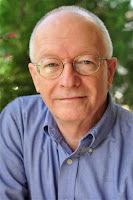 Henry’s debut novel, Journey to Riverbend, won the 2009 Operation First Novel contest.
Henry’s debut novel, Journey to Riverbend, won the 2009 Operation First Novel contest.Henry edits novels, leads critique groups, and teaches at conferences and workshops. He enjoys mentoring and coaching individual writers.
Connect with Henry on his BLOG, TWITTER and FACEBOOK.
Published on January 22, 2025 22:00
January 21, 2025
How Does a Writer Keep Up with Change?
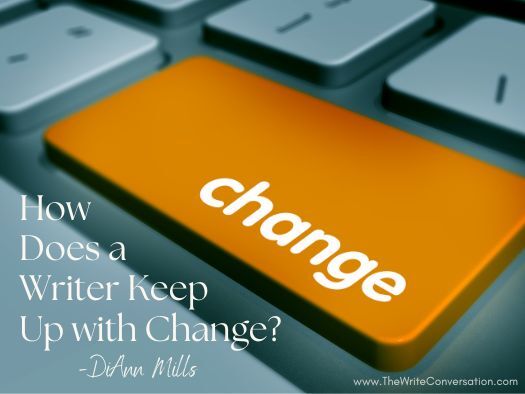
by DiAnn Mills @DiAnnMills
Changes in the publishing industry often send a streak of fear up a writer’s spine. We quiver at what is expected of us, and wonder if we can comply? Professional writers evaluate the publishing industry’s modifications and choose to accept or reject the change. Acceptance means adjusting, while ignoring might mean a writer’s publishing career is over.
None of us want our careers sliding to an abrupt halt. If the change meets our personal and professional guidelines, then we want to move forward. Updates emerge consistently with marketing, promotion, methods of publishing, platforms, writing genres, reader needs, style, publishers, and any number of updates that affect a writer’s career.
The question rises, how do writers keep up with changes in the publishing industry? Below is a list of tips and resources to ensure the latest information is available daily.
17 Ways for a Writer to Keep Up with the Changes in the Publishing Industry:Subscribe to industry newsletters and/or blogs, such as Ingram, Publishing.com, and The Writer’s Digest.Subscribe to your publishers’ newsletters, blogs, and podcasts.Subscribe to Publisher’s Weekly and Jane Friedman’s Hot Sheet.Subscribe to literary agents’ newsletters and/or blogs.Research reputable sites that offer specific up to date information regarding your marketing and promo questions, such as BookBub.Learn how to create memes, videos, and exceptional content through BookBrush, Canva, or YouTube. Stay active on social media, such as BookBub, Facebook, Goodreads, Instagram, LinkedIn, Pinterest, TikTok, YouTube, and X to establish and deepen your brand. *Don’t spread yourself too thin. Study the platform’s structure to see if your readers use it. I encourage you to follow established and respected writers in your genre, read what is posted, and comment.Join communities of authors and network and participate.Attend writer conferences in-person and online.Understand and know your readers’ needs.Consider joining the Authors Guild, Alliance of Independent Authors (ALLi), or the Association of American Publishers(AAP). Keep current with libraries through the American Library Association and state libraries.Own the latest edition of The Chicago Manual of Style.Own the latest edition of Christian Markets Guide, Children’s Writers Market Guide, Concise Guide to APA Style, Writers Market Guide, and/or a specialty market guide that fits your genre. Understand ethical use of AI and how publishers view the tool. For example: using AI to market, promote, brainstorm. Read. Read. Read.
We writers can keep updated on what is happening in our writing world, but the process takes discipline. Are you ready to accept the challenge?
TWEETABLE How Does a Writer Keep Up with Change? @DiAnnMills on @EdieMelson (Click to Tweet)
 DiAnn Mills is a bestselling author who believes her readers should expect an adventure. She creates action-packed, suspense-filled novels to thrill readers. Her titles have appeared on the CBA and ECPA bestseller lists; won two Christy Awards; and been finalists for the RITA, Daphne Du Maurier, Inspirational Readers’ Choice, and Carol award contests.
DiAnn Mills is a bestselling author who believes her readers should expect an adventure. She creates action-packed, suspense-filled novels to thrill readers. Her titles have appeared on the CBA and ECPA bestseller lists; won two Christy Awards; and been finalists for the RITA, Daphne Du Maurier, Inspirational Readers’ Choice, and Carol award contests. She is the former director of the Blue Ridge Mountain Christian Writers Conference, Mountainside Marketing Retreat, and Mountainside Novelist Retreat with social media specialist Edie Melson. Connect here: DiAnnMills.com
Published on January 21, 2025 22:00
January 20, 2025
Five Ways Writers Can Maintain Relevance

by Katherine Hutchinson-Hayes @KHutch0767
Staying updated on the continuously evolving writing landscape is essential for writers. With rapid advancements in technology and constant shifts in trends, it’s imperative to equip yourself with the tools and knowledge to remain relevant and effectively navigate the new challenges that arise.
There are current trends to consider, such as:AI-assisted writing Personalized contentVoice search optimizationContent repurposingInteractive and immersive experiencesInbound marketing
If you want to be a self-starter, there are tips for identifying trends:Check out what themes, storylines, and characters are selling wellLook for topics trending on social mediaFlesh out fresh stories or themes prompting debateConsider new words or terms being used
Here are five strategies to help you maintain your relevance in this dynamic, constantly changing writing environment:
1. Embrace Adaptability: In today’s fast-paced literary landscape, it’s vital to wholeheartedly welcome change and demonstrate adaptability in utilizing emerging writing platforms, cutting-edge technologies, and innovative styles. Embrace diverse audience inclinations and explore non-traditional formats like interactive storytelling, podcasts, and video content. Doing so can ensure your work remains relevant and captivating, forging meaningful connections with your readers. Resources like Writers’ Digest and The Creative Penn offer insights on how to adapt your writing to different formats.
2. Commit to Continuous Learning: To stay competitive in the writing market, prioritize continuous learning and skills development. Attend industry conferences, specialized workshops, and relevant online courses. Websites like Coursera and Master Class provide excellent learning opportunities for established authors and industry professionals. Staying up-to-date with the latest trends and best practices is crucial for enhancing your writing skills and boosting competitiveness.
3. Promote Audience Engagement: Understanding your audience is crucial for relevance. Engage actively in online forums related to your genre or niche to gain valuable insights and feedback. Attend author events such as book signings, literary festivals, and panel discussions to connect directly with readers. Additionally, maintain a strong presence on social media platforms like X (formerly known as Twitter), Threads, Instagram, or TikTok to interact with your audience, receive feedback, and tailor your content to better resonate with them. Tools like Hootsuite can help manage your social media engagement efficiently.
4. Advocate for Diversification: Diversifying your body of work is essential to staying adaptable and relevant in an ever-changing industry. Experiment with different genres, writing formats, and platforms to expand your audience reach and enhance your skills. Resources like NaNoWriMo provide prompts and challenges that encourage exploration and creativity, helping you maintain the freshness and originality of your work.
5. Stay Informed: Make a concerted effort to keep up with the latest industry news, popular culture trends, and current events relevant to your writing niche. Subscribe to newsletters, such as Publishers Weekly or The Writer, to stay informed about trending topics and deliver timely, pertinent information that engages your audience.
By actively incorporating these strategies into your writing practice, you’ll be better equipped to navigate the dynamic landscape of the publishing industry. This adaptability is essential for maintaining your influence and viability amid the challenges of advancing technology and shifting industry trends.
TWEETABLEFive Ways Writers Can Maintain Relevance from @KHutch0767 on @EdieMelson (Click to Tweet)
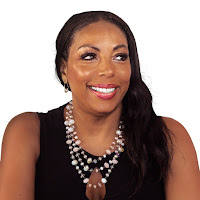 Dr. Katherine Hutchinson-Hayes is a review board member and contributor to Inkspirations (an online magazine for Christian writers), and her writing has been published in Guideposts. Her work in art/writing is distinguished by awards, including the New York Mayor’s Contribution to the Arts, Outstanding Resident Artist of Arizona, and the Foundations Awards at the Blue Ridge Mountains Christian Writer’s Conference (2016, 2019, 2021). She is a member of Word Weavers International and serves as an online chapter president and mentor. She belongs to FWA (Florida Writers Association), ACFW (American Christian Fiction Writers), CWoC (Crime Writers of Color),
Dr. Katherine Hutchinson-Hayes is a review board member and contributor to Inkspirations (an online magazine for Christian writers), and her writing has been published in Guideposts. Her work in art/writing is distinguished by awards, including the New York Mayor’s Contribution to the Arts, Outstanding Resident Artist of Arizona, and the Foundations Awards at the Blue Ridge Mountains Christian Writer’s Conference (2016, 2019, 2021). She is a member of Word Weavers International and serves as an online chapter president and mentor. She belongs to FWA (Florida Writers Association), ACFW (American Christian Fiction Writers), CWoC (Crime Writers of Color),AWSA (Advanced Writers and Speakers Association), and AASA (American Association of School Administrators). She serves on the nonprofit organization Submersion 14 board and the 540 Writer’s Community board and is an art instructor for the nonprofit organization Light for the Future. Katherine hosts the podcast Murder, Mystery & Mayhem Laced with Morality. She has authored a Christian Bible study for women and is currently working on the sequel to her first general market thriller novel. Her thriller A Fifth of the Story will debut in February 2024 through Endgame Press.
Katherine flourishes in developmental editing and coaching writers. She has a twenty-year career in education, leadership, and journalism. Katherine freelances as an educational consultant for charter schools, home school programs, and churches. In this role, she has written and edited curriculum, led program development, and helped manage growth facilitating and public relations.She also works as an editor and book coach through her consulting business. Katherine provides skill, accountability, and professionalism so clients can begin, develop, and finish their writing projects for publication.
Published on January 20, 2025 22:00
January 19, 2025
Purposeful Marketing for Writers & Authors
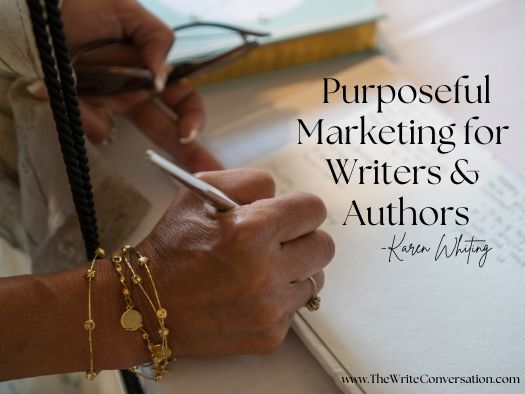
by Karen Whiting @KarenHWhiting
At the heart of purpose driven business is the desire for meaning in life. A a movement called the great resignation as few years ago happened as many people left their jobs due to lack of meaningful work.
At the heart of every book is the reason for writing it. Tapping into that purpose, and not the author's passion, draws readers because they are more interested in their own needs. Purpose puts the focus back on the reader as they discover books that give them meaning and match their dreams and hopes. As Christian authors there is always a purpose connected to faith and spiritual growth, and that's a good starting point in marketing.
Share the eternal perspective of the book and how it connects to purpose. Be authentic in connecting the meaningfulness that drew you to the topic. Challenge readers to think and dive into the topic whether through a fictional story or nonfiction talking points with real life examples.
Postmodernism that rejects objective fact is being challenged with a return to scholasticism and theism. Readers seek brands and books whose purpose aligns with their own. Some companies do this through connecting to a cause that reflects the values of the buyers.
A Budweiser commercial that connected to the opposite values of the buyers flopped. The company tried to pass on their passion and progressive thinking to an audience that rejected those values. A number of flops at the box office showcased a company’s agenda rather than connecting to the audience's goals .
Develop Purpose Driven Values When Marketing Your Books
Use a focus group of readers to be sure your ideas match their values and get feedback even on how to introduce purpose. Develop connections, and ask questions to clarify the perception of the book/brand. Connect with organizations that agree with the values to promote a deeper connection with followers.
State your core values and how they are developed in the book. We see Christian business people using Business as a Mission (BAM) strategy in their companies. It keeps them connected to Christ and guides them to make kingdom-oriented choices. Once you identify your core values in your book, reach out to audiences who share those values.
Be specific about goals. For example, with parenting books that includes communication skills share specific goals involving connecting to people, such as developing empathy. Set goals that are measurable like the child will use kind words daily and respond to needs of children around them. Make sure the goals are attainable such as a child will start using empathetic and encouraging words daily.
Since content remains important in marketing, be sure to include the goals in posts and other content. Plan out a few months of content that will reinforce the goal and give readers ideas of actions to promote the shared values.
Developing a Purpose Driven Book Marketing Strategy
Design the book with the purpose in mind. In nonfiction, share action steps to help [people apply the purpose. Each chapter may end with ideas of how to put the principles discussed into action, or a challenge to achieve a step of the goal. Or t reflective questions to help readers identify why the values are important and give their life meaning.In fiction, write scenes and actions for characters to develop the purpose, so a character may decide to be kinder and start getting involved in activities that let them help people in need, or mindfully express appreciation.Plan ahead to create posts with more action steps and ways to continue fulfilling the purpose. Tie the purpose to the motivation to continue on the path of their purpose in the face of adversity. It becomes a quest to follow, a path to stay on because of the meaningfulness of the purpose that makes life worthwhile. Being in community helps readers believe they are part of something bigger than themselves and that together they can achieve more.Keep a list of the action steps and why they matter. Build on these in promoting the book to align with readers who share that underlying purpose. This will help you develop a familiar voice that represents the purpose.Keep a list of stories that share how the purpose is lived out. Some will go into the book while others will be great for articles, posts, and speaking on the book's topic and the purpose behind the book.Listen to your readers and ask why they care about that purpose. Use their feedback in marketing whether mentioning comments or creating posts that showcase the feedback. Collect their stories too. to foster the community and showcase activities of readers.Make plans to stay connected with readers whether it's a group, blog, or posts. Be consistent in communication via the method(s) you develop. Stay on the purpose and meaning behind the book.The purpose should flow from your heart and be part of your brand. My books focus on the family, both our earthly family and our heavenly one. I strive to be creative and thus share creative ways to connect and build family. Those creative ideas are often expanded in my posts and blog, plus they flow easily in interviews. Since it is my life's purpose to encourage families and help them develop lasting brands, it's natural for me to write and market with that focus.
TWEETABLEPurposeful Marketing for Writers & Authors from @KarenHWhiting on @EdieMelson (Click to Tweet)
 Start now to define your purpose and know how it's part of whatever you write and market.Karen Whiting (WWW.KARENWHITING.COM) is an international speaker, former television host of Puppets on Parade, certified writing and marketing coach, and award-winning author of twenty-seven books for women, children, and families. Her newest book, The Gift of Bread: Recipes for the Heart and the Table reflects her passion for bread and growing up helping at her grandparent’s restaurant. Check out her newest book Growing a Mother’s Heart: Devotions of Faith, Hope, and Love from Mothers Past, Present, and Future. It's full of heartwarming and teary-eyed stories of moms.
Start now to define your purpose and know how it's part of whatever you write and market.Karen Whiting (WWW.KARENWHITING.COM) is an international speaker, former television host of Puppets on Parade, certified writing and marketing coach, and award-winning author of twenty-seven books for women, children, and families. Her newest book, The Gift of Bread: Recipes for the Heart and the Table reflects her passion for bread and growing up helping at her grandparent’s restaurant. Check out her newest book Growing a Mother’s Heart: Devotions of Faith, Hope, and Love from Mothers Past, Present, and Future. It's full of heartwarming and teary-eyed stories of moms.Karen has a heart to grow tomorrow’s wholesome families today. She has written more than eight hundred articles for more than sixty publications and loves to let creativity splash over the pages of what she writes. She writes for Crosswalk. Connect with Karen on Twitter @KarenHWhiting Pinterest KarenWhiting FB KarenHWhiting.
Published on January 19, 2025 22:00
January 18, 2025
Writing Conference Season, Writers Be Prepared
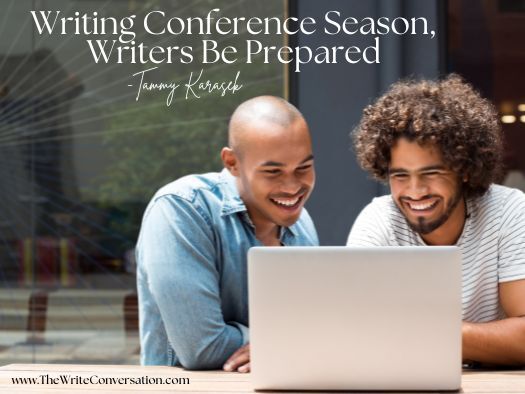
by Tammy Karasek @TickledPinkTam
The 2025 writing conference season is underway. Across the United States writers of all levels are meeting or making plans to meet up with other writers to hone their craft. Many of the conferences offer more than writing classes now. You can often find classes on how to market, create a podcast, become a speaker, write a script for theater or screen and so much more.
When you choose which conference or conferences you will attend this year, make sure you look through not only the faculty, but what they will teach. If you desire to start your podcast this year, does the conference you want even have a class or two on that topic? If you’re a nonfiction writer, to attend a fiction only conference will leave you disappointed at that particular conference.
Once you’ve prayed about, then narrowed your choice or choices of what it is you desire to work on this year in your writing journey, seek conferences that will be strong in that topic. There are so many to choose from all over the country and throughout the year. I can’t stress enough the importance to look through the class offerings. I’ve heard from too many folks where they’ve picked a conference because of the keynote speaker, then complain that the “conference” was terrible because they didn’t have classes that were beneficial to them. It wasn’t the conference that was terrible, it was poor planning on the conferee’s part. Check those classes.
The above scenario is what would be referred to as bad ROI—return on investment. You want your money spent to aid in your growth. Yes, conferences do cost money. But if you’ve been called to write, this is your career. You are worth investing in. None of us get called to write or speak and have it all figured out the day the lightbulb moment comes to you. Ask any long-time, multi-published author if they’ve ever taken a class, and I guarantee you most of them will admit they still take a class here and there. Don’t ignore investing in classes and conferences.
For some, travel to a conference is not possible for various reasons. That’s where the online conferences come in handy. There are several I know of that do a great job of offering great faculty and classes to help writers and speakers grow. Like I said above, pray about what you’d like to improve.
If you find a conference or several that meet your need, put out questions to your social media contacts asking if anyone has attended those. Ask questions that are important to you. Are meals included, or will you need to plan going to a restaurant into your schedule and budget? Is lodging included? Are the folks on faculty approachable? Will you have opportunity to meet with faculty and agents for free or will there be a fee for that? Does the faculty mingle with conferees or do they hide away in their rooms?
Gathering information about a conference is time well spent to make your conference experience the best you can. The effort in doing the homework will also help you settle on one or two conferences to try for this year.
I dare to say, no conference is perfect, but there is at least one or two that is a perfect fit for you. Give it a try.
Let’s start the writing conversation, what are some of the conferences you have attended over the years to improve how you write, speak, podcast, market or other? Do tell!
TWEETABLEWriting Conference Season, Writers Be Prepared from @TickledPinkTam on @EdieMelson (Click to Tweet)
 Tammy Karasek uses humor and wit to bring joy and hope to every aspect in life. Her past, filled with bullying and criticism from family, drives her passion to encourage and inspire others and give them The Reason to smile. She’s gone from down and defeated to living a “Tickled Pink” life as she believes there’s always a giggle wanting to come out! A writer of Romance—with a splash of sass. She’s also The Launch Team Geek helping authors launch their books and also a Virtual Assistant for several best-selling authors. Don't miss her recent book, LAUNCH THAT BOOK, just released in November.
Tammy Karasek uses humor and wit to bring joy and hope to every aspect in life. Her past, filled with bullying and criticism from family, drives her passion to encourage and inspire others and give them The Reason to smile. She’s gone from down and defeated to living a “Tickled Pink” life as she believes there’s always a giggle wanting to come out! A writer of Romance—with a splash of sass. She’s also The Launch Team Geek helping authors launch their books and also a Virtual Assistant for several best-selling authors. Don't miss her recent book, LAUNCH THAT BOOK, just released in November. Her work was also published in a Divine Moments Compilation Book—Cool-inary Moments. She’s also the Social Media Manager for the Blue Ridge Mountains Christian Writers Conference, Founding President and current Vice-President of ACFW Upstate SC, and Founding President of Word Weavers Upstate SC. She’s a writing team member for The Write Conversation Blog, Novel Academy, MBT Monday Devotions, The Write Editing and more. Connect with Tammy at HTTPS://WWW.TAMMYKARASEK.COM.
Published on January 18, 2025 22:00
January 17, 2025
When Can I Call Myself a Writer
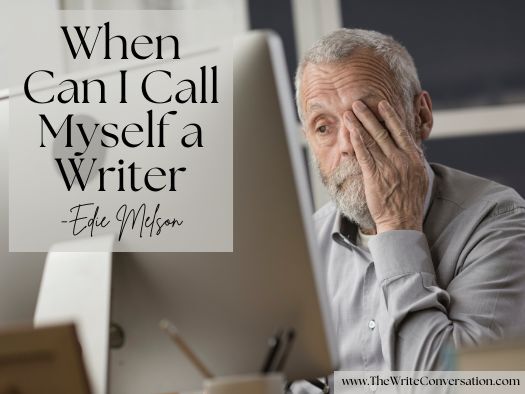
by Edie Melson @EdieMelson
This question comes up a lot when I meet with writers—especially writers who aren’t yet officially published. And while I’ve been known to give a quick (and fairly accurate) answer:
“If you write, you’re a writer.”
I do know the answer is not quite that easy.
This dilemma of when to announce, "I am a writer!" is wrapped up with strands of imposter syndrome, general insecurity, expectations, and emotions.
Lots and lots of emotions.
When I first began going to writing conferences, I struggled with this issue. I didn’t feel like I was qualified to call myself a writer. I assumed that when people heard me name myself a writer, their expectations wouldn’t be met by what I had actually done. I was terrified by being asked where they could purchase or read what I’d written.
And at that point, I didn’t have much of anything to send them to.
In truth, I’d been a writer, albeit a technical writer for almost 10 years when I attended my first conference. But like most of us, I decided that wasn’t real writing.
So back to the question, “When do I get to call myself a writer—and not be misleading people.”
That last part is the crux of the matter. Most of us would be fine saying the word, “I am a writer” out loud if we didn’t think someone would disagree. Or if we felt like we were professional enough or truly called enough to justify the label.
3 Basic Truths about Labeling Yourself as a Writer1. You’re going to begin by not feeling like a real writer. Sometimes even with multiple books, you don’t feel like a writer. Sorry, our emotions are just not a good judge of this issue.2. There is always going to be some well-meaning soul who wants to debate what it means to be a writer. 3. Your worst critic—about claiming the label writer—will always be yourself.
My Personal Checklist for Calling Myself a Writer1. Am I working and spending money to learn the craft of writing? This means am I attending conference, taking classes, reading books and blogs, and joining groups. 2. Am I actually writing. It’s not enough (for me) to be learning about writing, I want to also be writing. 3. Am I submitting my work for someone else’s opinion? This could be submitting for publication, to a contest, or just what I write for an honest critique.
At this point—with these three things checked off my list—I allowed myself to be labeled a writer.
There are also additional things that help us feel like writers. These include:1. Submitting our work for publication. This publication could be paid or unpaid. If someone deems my words good enough to show to others, I am a writer.2. Winning awards for things that aren’t yet published. I won numerous awards with my unpublished entries and that helped me feel more like a writer.3. Calling myself a writer. Putting on the label writer is a lot like breaking in a pair of work or hiking boots. At first they’re stiff, and don’t seem to move the way my foot moves. But if I give the boots time and I actually wear them, they begin to conform to my foot. They provide stability when I’m doing hard things, and they give me protection and actually help me do the job better.
I encourage each of you who are struggling to practice calling yourself a writer. Try out the label, give yourself time to conform to you. Let the label give you stability and protection. And most of all, do not give in to negative feelings and the small voice in your mind that tells you lies. Hey, you’re reading this blog and you’re working at improving your skills. In my mind, there is NO DOUBT each of you deserves the title, WRITER!
Now it’s your turn. For those of you past this hurdle (of calling yourself a writer) when did you adopt the title? For those of you struggling with this, what is keeping you from calling yourself a writer? Leave your thoughts in the comments section below.
Don’t forget to join the conversation!Blessings,Edie
TWEETABLEWhen Can I Call Myself a Writer? thoughts from @EdieMelson (Click to Tweet)
 Edie Melson is a woman of faith with ink-stained fingers observing life through the lens of her camera. No matter whether she’s talking to writers, entrepreneurs, or readers, her first advice is always “Find your voice, live your story.” As an author, blogger, and speaker she’s encouraged and challenged audiences across the country and around the world. Her numerous books reflect her passion to help others develop the strength of their God-given gifts and apply them to their lives. Connect with her on her website, through Facebook, Twitter and Instagram.
Edie Melson is a woman of faith with ink-stained fingers observing life through the lens of her camera. No matter whether she’s talking to writers, entrepreneurs, or readers, her first advice is always “Find your voice, live your story.” As an author, blogger, and speaker she’s encouraged and challenged audiences across the country and around the world. Her numerous books reflect her passion to help others develop the strength of their God-given gifts and apply them to their lives. Connect with her on her website, through Facebook, Twitter and Instagram.
Published on January 17, 2025 22:00



